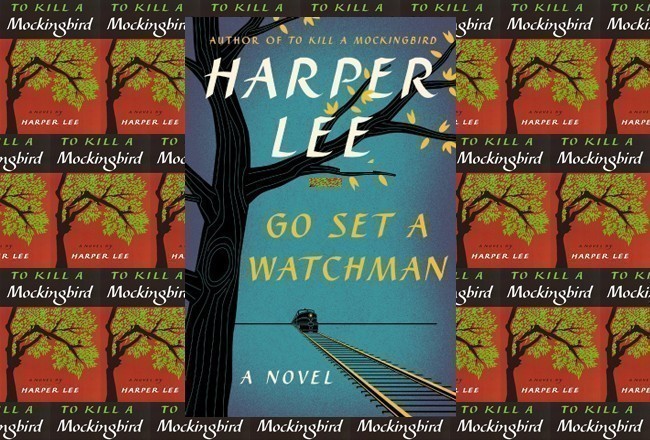
Welcome to part 10 of FlaglerLive’s live-blogging of “Go Set a Watchman.” We’ve invited 10 people of varied backgrounds from around the community to read the book and write their response to each of its 19 chapters, from whatever perspective they choose, at whatever length they choose, in 19 installments over the next few weeks. For a few more details on the project, read the introduction here. As always, we start with a summary of the chapter at hand and dive into the critics’ responses. So you’re forewarned: the spoiler alert is implied.
As we cross the mid-way point of this difficult book–difficult, most of us agree, for the wrong reasons–it looks like the Watchman craze for lost episodes is rippling yet again: a couple of weeks back it was a Shirley Jackson collection of shreds her publisher discovered. Last week it was a lost one from, heaven help us, Ayn Rand. The brevity of the book (at 246 pages) would suggest that it could not possibly be a Rand production. A lost chapter, maybe. But a whole novel? “Kay Gonda,” the Times reviewer Michiko Kakutani tells us of the central character, “is one of Rand’s Nietzschean protagonists — an über-frau who has fans, not friends, and who thinks that she towers above all the losers and “second-handers” who populate the world.” Now the picture is clearer. It’s Donald Trump in drag, and in hard covers. Pass. Happier to return to Lee’s Watchman, head-banging as the experience has been, after a bit of an unforgivable hiatus.
![]()
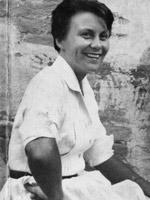
Our Ten Critics: Quick Links
- Today’s Chapter Summary
- Brian McMillan
- Mary Ann Clark
- Jon Hardison
- Monica Campana
- Mark Carpanini
- Inna Hardison
- Daniel Masbad
- Bill McGuire
- Pierre Tristam
![]()
Chapter 10 summary: Jean Louise vomits, has an exchange with the man who served her ice cream, then an exchange with her Aunt Alexandra about where she’s been. She is suffering the hang-over of discovering her father’s and boyfriend’s association with the citizen’s council: ” Had she insight, could she have pierced the barriers of her highly selective, insular world, she may have discovered that all her life she had been with a visual defect which had gone unnoticed and neglected by herself and by those closest to her: she was born color blind.”
 Brian McMillan, columnist and executive editor of the Palm Coast Observer: Chapter 10 has two intriguing concluding paragraphs that lead me to believe that the narrator’s views on race and Jean Louise’s views on race are not the same. It leaves me wondering about Harper Lee’s views on race.
Brian McMillan, columnist and executive editor of the Palm Coast Observer: Chapter 10 has two intriguing concluding paragraphs that lead me to believe that the narrator’s views on race and Jean Louise’s views on race are not the same. It leaves me wondering about Harper Lee’s views on race.
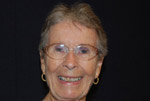 Mary Ann Clark, founder of Flagler Reads Together and president of the Flagler County Historical Society: If I had been Lee’s advisor/editor, this chapter would have followed or been part of Chapter 8. It continues chronicling Jean Louise’s disillusionment and sorrow following viewing the council meeting. The last paragraph is wonderfully insightful—being able to say one is “color blind.” In addition, it must be lovely to “take to your bed.”
Mary Ann Clark, founder of Flagler Reads Together and president of the Flagler County Historical Society: If I had been Lee’s advisor/editor, this chapter would have followed or been part of Chapter 8. It continues chronicling Jean Louise’s disillusionment and sorrow following viewing the council meeting. The last paragraph is wonderfully insightful—being able to say one is “color blind.” In addition, it must be lovely to “take to your bed.”
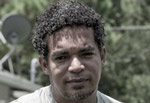 Jon Hardison, co-owner of Ha Media in Palm Coast and member of the FlaglerLive board of directors: I’ve been bothered since chapter 8 and chapters 9 and 10 haven’t helped. If I’m being entirely honest, I’m about done with this book. By measure of the pages at the binding we’re 48 percent of the way through and there is still little to bind me to anyone or anything in it. Lee has taken us from the silly, through the contrived and walked us right up to the ridiculous. I’m sorry, but am I really being asked to believe that Scout didn’t know?
Jon Hardison, co-owner of Ha Media in Palm Coast and member of the FlaglerLive board of directors: I’ve been bothered since chapter 8 and chapters 9 and 10 haven’t helped. If I’m being entirely honest, I’m about done with this book. By measure of the pages at the binding we’re 48 percent of the way through and there is still little to bind me to anyone or anything in it. Lee has taken us from the silly, through the contrived and walked us right up to the ridiculous. I’m sorry, but am I really being asked to believe that Scout didn’t know?
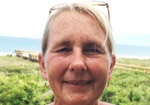 Monica Campana, just-retired head librarian at Indian Trails Middle School and free-speech advocate: Jean Louise had a visual defect and it wasn’t color blindness. She was just plain blind. Her highly selective insular world view was a choice. The war was and still is being fought in plain view.
Monica Campana, just-retired head librarian at Indian Trails Middle School and free-speech advocate: Jean Louise had a visual defect and it wasn’t color blindness. She was just plain blind. Her highly selective insular world view was a choice. The war was and still is being fought in plain view.
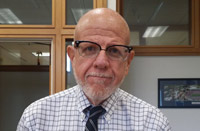 Circuit Judge Mark Carpanini took office in the Tenth Judicial Circuit in Florida in 2005 in Polk County, where he still serves: Jean Louise, after leaving the courthouse, vomits. It is Jean-Paul Sartre’s existential nausea. She would rather have had Atticus spit in her face. She wanders the town in a daze and eventually returns home, where she speculates that she is different in a fundamental way from the ones she loves. She has been at the same time alienated and bertrayed.
Circuit Judge Mark Carpanini took office in the Tenth Judicial Circuit in Florida in 2005 in Polk County, where he still serves: Jean Louise, after leaving the courthouse, vomits. It is Jean-Paul Sartre’s existential nausea. She would rather have had Atticus spit in her face. She wanders the town in a daze and eventually returns home, where she speculates that she is different in a fundamental way from the ones she loves. She has been at the same time alienated and bertrayed.
 Inna Hardison, co-owner of Ha Media and former publisher of Palm Coast Lifestyles magazine: Scout is fucking indisposed. That’s it. Indisposed. I predicted this particular “malady” in one of my previous assessments, only I was being snarky then… I just can’t, for the life of me, picture this mid-twenties-supposedly-not-an-idiot broad, with not just the benefit of having read everything and being taught everything else of value by the embodiment of justice and fairness that was Atticus, but also the benefit of having spent years in some college or another (presumably full of people and books and goings on) and then all that time in New York turning up at home as such a whimpering infantile fool. Oh, but the defect of her having been born “color-blind” is supposed to make up for it.
Inna Hardison, co-owner of Ha Media and former publisher of Palm Coast Lifestyles magazine: Scout is fucking indisposed. That’s it. Indisposed. I predicted this particular “malady” in one of my previous assessments, only I was being snarky then… I just can’t, for the life of me, picture this mid-twenties-supposedly-not-an-idiot broad, with not just the benefit of having read everything and being taught everything else of value by the embodiment of justice and fairness that was Atticus, but also the benefit of having spent years in some college or another (presumably full of people and books and goings on) and then all that time in New York turning up at home as such a whimpering infantile fool. Oh, but the defect of her having been born “color-blind” is supposed to make up for it.
I want to take that drippy soppy ice cream and smother her in it in the hopes that she’d wake up, that she’d get angry, not indisposed, that she’d bloody invite Hank in and punch him in the schnoz for having watched him at the KKK-like orgy.
The upside – it’s only two pages long. And for that, I’m thankful.
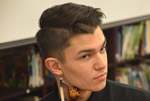 Daniel Masbad, 2015 high school graduate (home-schooled) and concertmaster of the Flagler Youth Orchestra: To echo another commentator (there might actually be more than one), how are Jean Louise’s father’s ties to a racist agenda and, effectively, his blatant racism breaking news to her? Am I to believe that they are legitimately new? Can an individual, especially one as presumably fleet-minded as Atticus Finch, be manipulated into believing the sort of doctrine on display a few chapters back? Or should I be attributing this shift to senility? I’m not buying. This being a very short chapter, the only other thing I have to say is that I cannot really understand or relate to Jean Louise’s reaction to what she has experienced. I’m realizing now that I don’t think I know what it means to be betrayed. In any event, I am actually a bit excited to see what comes with Part IV, a sentiment I was not expecting to encounter.
Daniel Masbad, 2015 high school graduate (home-schooled) and concertmaster of the Flagler Youth Orchestra: To echo another commentator (there might actually be more than one), how are Jean Louise’s father’s ties to a racist agenda and, effectively, his blatant racism breaking news to her? Am I to believe that they are legitimately new? Can an individual, especially one as presumably fleet-minded as Atticus Finch, be manipulated into believing the sort of doctrine on display a few chapters back? Or should I be attributing this shift to senility? I’m not buying. This being a very short chapter, the only other thing I have to say is that I cannot really understand or relate to Jean Louise’s reaction to what she has experienced. I’m realizing now that I don’t think I know what it means to be betrayed. In any event, I am actually a bit excited to see what comes with Part IV, a sentiment I was not expecting to encounter.
 Bill McGuire, Palm Coast City Councilman and management consultant: I am not an author, or an editor of the written word. Having said that, I wonder why this four-page chapter is not part of chapter 9. Anyway, this chapter has Jean Louise returning home from wandering about the town, wrestling with her thoughts. She is met at the front door by Aunt Alexandra, who scolds her in the usual fashion about her dress, appearance and comportment. Not in the mood to hear it, Jean Louise informs Alexandra that she is going to her room and does not wish to be disturbed by anyone. She calls her uncle, Dr. John, and arranges to meet him the following day, after which the chapter ends. Next up – part four.
Bill McGuire, Palm Coast City Councilman and management consultant: I am not an author, or an editor of the written word. Having said that, I wonder why this four-page chapter is not part of chapter 9. Anyway, this chapter has Jean Louise returning home from wandering about the town, wrestling with her thoughts. She is met at the front door by Aunt Alexandra, who scolds her in the usual fashion about her dress, appearance and comportment. Not in the mood to hear it, Jean Louise informs Alexandra that she is going to her room and does not wish to be disturbed by anyone. She calls her uncle, Dr. John, and arranges to meet him the following day, after which the chapter ends. Next up – part four.
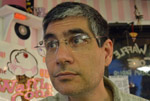 Pierre Tristam, editor of FlaglerLive: I recall an episode of M*A*S*H where Hawkeye vomits all over his corner of Korea from his latest hangover. He’s despairing over the futility of the war whose wounds he mends all day, though he presumably vomited after pulling his very first shift in the first hours of his assignment. Scout has a similar reaction from discovering, after a quarter century, that her father and boyfriend are as bigoted as the rest of town. It took her only 26 years to see. Past those two opening paragraphs, the chapter is a ramble. I did not understand Scout’s interaction with the ice cream man. The interaction with Aunt Alexandra seems a repeat from an earlier chapter. And I was saddened to realize that after all this, we’re barely past the halfway point.
Pierre Tristam, editor of FlaglerLive: I recall an episode of M*A*S*H where Hawkeye vomits all over his corner of Korea from his latest hangover. He’s despairing over the futility of the war whose wounds he mends all day, though he presumably vomited after pulling his very first shift in the first hours of his assignment. Scout has a similar reaction from discovering, after a quarter century, that her father and boyfriend are as bigoted as the rest of town. It took her only 26 years to see. Past those two opening paragraphs, the chapter is a ramble. I did not understand Scout’s interaction with the ice cream man. The interaction with Aunt Alexandra seems a repeat from an earlier chapter. And I was saddened to realize that after all this, we’re barely past the halfway point.





























Leave a Reply